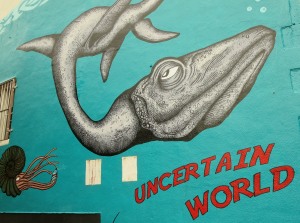We don’t know what is going to happen to our planet.
Because of us, because of humans, because of society, because of our knowledge, creativity, power and ingenuity, the world is changing in ways unprecedented in the experience of anyone alive… in the experience of human society… in the history of Earth. We are creating a hotter world, a stormier world, a polluted world. But most of all, we are creating an Uncertain World.
This site explores what that means and how we must adapt. It comprises a patchwork of random, often disconnected observations and arguments, reflecting its author and the diverse colleagues who have shaped my understanding of this Uncertain World and the marvellous but flawed species that is creating it.
I am a biogeochemist and a palaeoclimatologist. I study the interplay of different components of the Earth system, the molecular evolution of life and the environmental history of our planet. I am a farm boy, having grown up on a small and poor dairy farm in Ohio. I am an unapologetic social justice warrior, shaped not only by the class prejudices I experienced through my life but the racism and sexism that was endemic in rural America… as well as cosmopolitan Europe. I am intellectually indebted to interdisciplinary thinking and collaboration. My scientific career started in 1992, marrying biology, geology and chemistry. 20 years later, in 2013, I became Director of the Cabot Institute at the University of Bristol and a few months later Bristol was announced as the sixth European Green Capital (for 2015) and to date the only UK Green Capital. As the Director and co-Founder of an interdisciplinary research institute, I have worked with artists, historians, health workers, engineers and scientists, I was invited to COP21 by the Mayor, challenged on institutional racism by our partners in the city, and contributed to our city’s Resilience Strategy and One City Plan.
This site hopefully captures some of those experiences and what I have learned – from building the Cabot Institute, from academic colleagues from every intellectual corner of the institution, from engaging with local to global partners, leaders and visionaries, from working with Bristol’s leadership as well as its passionate grass roots activism, from preparing our city for COP21 and the most important climate negotiations of our time but most of all from being challenged by my colleagues and fellow Bristol residents, especially those most marginalised and silenced in the past.
So then: how will we live on this Uncertain World?
We will need imagination, creativity and bravery. We will become more adroit, flexible and radically resilient. In my experience, these traits are rare in individuals and instead thrive in communities of diverse knowledge, experiences, skills and perspectives. They are generated by the intellectual diversity of working across disciplines or sectors on new challenges as well as the cultural and social diversity that arises from different experiences, societies, histories and religions. It is this melding – and sometimes clash – of perspectives that creates genuinely new sparks of innovation. But diversity does not begin and end with an invitation to participate. Diversity demands equity. It demands not just a seat at the table but a voice in the room and the resources to participate. It requires work and humility; it requires that we challenge injustice in our society but also in ourselves and our own institutions.
In doing so, we can have fun. We can and must be a bit weird. And for that I thank the many artists with whom I have worked, who have helped us ponder the Uncertain World through Fog Bridges and Withdrawn fishing boats in Leigh Woods. And Alex Lucas’ quirky images of a flooded Bristol, re-experiencing its Jurassic past.

But central to all of that will be creating a more inclusive and equitable discipline, research environment, movement, and society. I wrote this in EOS in 2016: “Science thrives when diverse cultures, experiences and world views interact. And this is particularly true for the geosciences, a discipline that is truly global in perspective. I want to share perspectives with colleagues who grew up looking at Saharan sunsets or fishing in the Caspian Sea or subsistence farming in Somalia. I want to share perspectives with those who have experienced first-hand the aridification of their land, the pillaging of their forests, or the ravages of war on their soil. I want to share perspectives with those who grew up in cities and never saw an outcrop until their first field course. When we lose different groups, whether on racial, class or religious grounds, we lose their knowledge, experiences, skills and perspectives and science suffers because of it.” I reject some of this framing now as it suggests a transactional value for diversity and equity rather than demanding that those principles be supported solely because that is the right thing to do. And yet I cannot bring myself to delete those words because I do love diversity and the power of shared experiences can change a person, and in doing so can change the world.
And that is an ideal illustration of what it means to live in the Uncertain World – our thinking and understanding must evolve, we must embrace nuance and complexity, and we must sometimes hold onto contradictory truths.
I am grateful to the ERC funding of the Advanced ERC Grant TGRES (The Greenhouse Earth System) and NERC, which has supported much of the research and engagement on these pages. Check out Bristol Blogs for reflections from colleagues across the University and of course the Cabot Institute blog. And follow all of us on twitter: @rpancost @UoBEarthScience @cabotinstitute

